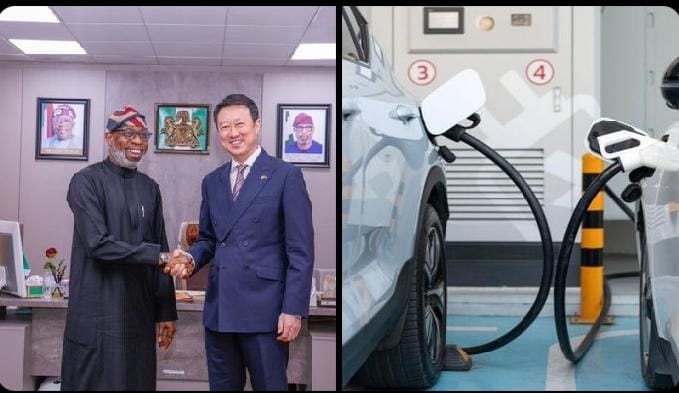In a transformative development for Nigeria’s economic landscape, the Chinese Ambassador to Nigeria, Yu Dunhai, has unveiled ambitious plans to establish electric vehicle (EV) factories in the country. This initiative, rooted in a strategic partnership between Nigeria and China, signals a new era of collaboration focused on unlocking the immense potential of Nigeria’s solid minerals sector, particularly its lithium reserves. With the global shift toward sustainable energy accelerating, this move positions Nigeria as a potential hub for EV manufacturing in Africa. In this blog post, we’ll dive deep into the details of this announcement, its implications for Nigeria’s economy, the challenges ahead, and the broader context of China-Nigeria relations.
The Announcement: A Strategic Vision for Collaboration
During a recent engagement, Ambassador Yu Dunhai emphasized the need for enhanced collaboration between China and Nigeria to harness the country’s abundant mineral resources. Nigeria is endowed with vast deposits of solid minerals, including lithium, a critical component in EV batteries. The ambassador’s announcement aligns with a broader agreement forged during Nigerian President Bola Tinubu’s state visit to China in 2024, where he met with Chinese President Xi Jinping. The leaders signed a series of bilateral agreements aimed at deepening economic ties, with a particular focus on industrial cooperation and resource development.
The establishment of EV factories is a cornerstone of this partnership. By setting up manufacturing plants in Nigeria, China aims to tap into the country’s lithium reserves while supporting Nigeria’s ambition to diversify its economy beyond oil. The initiative is not just about extracting raw materials but also about fostering local value addition—a key priority articulated by Nigeria’s Minister of Solid Minerals Development, Dele Alake. According to Alake, Nigeria is moving away from the colonial-era model of exporting raw minerals to focus on in-country processing and manufacturing. The EV factories will produce vehicles and batteries domestically, creating jobs, boosting industrial capacity, and positioning Nigeria as a player in the global green energy market.
Why Lithium and Electric Vehicles Matter
Lithium is often dubbed “white gold” due to its critical role in powering the clean energy revolution. As the world transitions from fossil fuels to renewable energy, demand for lithium-ion batteries—used in EVs, smartphones, and energy storage systems—has skyrocketed. Nigeria’s lithium deposits, found in states like Nasarawa, Kwara, and Plateau, are among the highest-grade in the world, making the country an attractive destination for investors in the EV supply chain.
China, the global leader in EV production and battery manufacturing, is strategically positioning itself to secure access to Nigeria’s lithium. By establishing factories in Nigeria, Chinese companies can reduce reliance on lithium imports from other regions, such as Australia or South America, while benefiting from Nigeria’s proximity to African markets. For Nigeria, the partnership offers a chance to industrialize, create jobs, and generate foreign exchange through exports of processed lithium products and EVs.
The EV factories will also align with global sustainability goals. With countries like the European Union and the United States setting ambitious targets to phase out internal combustion engine vehicles by 2035, the demand for EVs is expected to soar. Nigeria’s entry into this market could position it as a regional leader in sustainable transportation, provided the government can address infrastructural and regulatory challenges.
Nigeria’s Push for Local Value Addition
One of the most significant aspects of this initiative is Nigeria’s emphasis on local value addition. Historically, Nigeria’s mining sector has been plagued by the export of raw minerals, which limits economic benefits and perpetuates dependency on foreign processing. Minister Dele Alake has been vocal about reversing this trend, advocating for policies that prioritize domestic processing and manufacturing.
The EV factories represent a practical step toward this goal. By processing lithium into battery-grade materials and assembling EVs locally, Nigeria can retain more economic value within its borders. This approach is expected to create a ripple effect across the economy, from job creation in mining and manufacturing to the growth of ancillary industries like logistics and technology. Alake has also highlighted the government’s commitment to creating an enabling environment for investors, including streamlined licensing processes and incentives for companies that prioritize local content.
The Role of Chinese Firms and Regulatory Challenges
Chinese companies are already active in Nigeria’s mining sector, with several firms involved in lithium exploration and extraction. However, their operations have not been without controversy. Illegal mining activities, environmental degradation, and lax compliance with regulations have raised concerns among local communities and authorities. To address these issues, the Nigerian government has deployed Mining Marshals, a specialized task force tasked with curbing illegal mining and enforcing compliance with mining laws.
The success of the EV factory initiative will hinge on the ability of Chinese firms to operate transparently and sustainably. Nigeria’s government has signaled its readiness to partner with investors who align with its vision of responsible resource development. This includes adhering to environmental standards, engaging with local communities, and investing in skills transfer to empower Nigerian workers.
Broader Implications for Nigeria’s Economy
The establishment of EV factories could have far-reaching implications for Nigeria’s economy. Here are some key areas of impact:
-
Job Creation: The EV manufacturing ecosystem—from mining to battery production to vehicle assembly—is labor-intensive. Thousands of direct and indirect jobs could be created, particularly for Nigeria’s youthful population, which faces high unemployment rates.
-
Economic Diversification: Nigeria’s economy has long been overly reliant on oil, which accounts for over 80% of export earnings. The EV initiative offers a pathway to diversify revenue streams, reducing vulnerability to global oil price fluctuations.
-
Technology Transfer: Collaboration with Chinese firms could facilitate the transfer of advanced technologies to Nigeria, building local capacity in areas like battery manufacturing and EV design.
-
Regional Leadership: As one of Africa’s largest economies, Nigeria has the potential to become a hub for EV production in West Africa. This could attract further investment and strengthen Nigeria’s influence in regional trade networks like the African Continental Free Trade Area (AfCFTA).
-
Energy Transition: The EV factories could spur investments in renewable energy infrastructure, such as solar or wind power, to support manufacturing operations and charging networks. This aligns with Nigeria’s commitments under the Paris Agreement to reduce carbon emissions.
Challenges and Risks
While the prospects are exciting, several challenges could hinder the success of this initiative:
-
Infrastructure Deficits: Nigeria’s unreliable power supply, poor road networks, and limited industrial infrastructure could pose logistical challenges for EV manufacturing. Significant investments in energy and transportation infrastructure will be needed to support the factories.
-
Regulatory Uncertainty: Nigeria’s mining sector has historically suffered from inconsistent policies and bureaucratic red tape. The government must maintain a stable and predictable regulatory framework to sustain investor confidence.
-
Security Concerns: Insecurity in some lithium-rich regions, including banditry and communal conflicts, could disrupt mining operations. The government’s Mining Marshals and other security measures will need to be scaled up to ensure a safe operating environment.
-
Environmental Impact: Lithium mining and EV production can have significant environmental consequences, including water contamination and habitat destruction. Robust environmental safeguards will be essential to prevent long-term damage.
-
Competition: Nigeria is not the only African country with lithium reserves. Countries like Zimbabwe and the Democratic Republic of Congo are also attracting Chinese investment in the EV supply chain. Nigeria must differentiate itself through competitive policies and efficient implementation.
The Bigger Picture: China-Nigeria Relations
The EV factory initiative is part of a broader deepening of China-Nigeria relations. China is Nigeria’s largest trading partner, with bilateral trade exceeding $20 billion annually. Over the past two decades, Chinese investments in Nigeria have spanned infrastructure, agriculture, and manufacturing, including landmark projects like the Lagos-Ibadan railway and the Lekki Deep Sea Port.
However, the relationship has not been without tensions. Critics have raised concerns about debt sustainability, given Nigeria’s reliance on Chinese loans for infrastructure projects. There are also worries about the trade imbalance, with Nigeria exporting raw materials while importing finished goods from China. The EV factories could help address these concerns by fostering mutual economic benefits and reducing Nigeria’s dependence on raw material exports.
Looking Ahead: A Vision for Sustainable Growth
The announcement of Chinese-backed EV factories in Nigeria marks a pivotal moment for the country’s solid minerals sector and its broader economic ambitions. If successfully implemented, this initiative could transform Nigeria into a key player in the global EV market, drive industrialization, and create opportunities for millions of Nigerians. However, realizing this vision will require careful planning, robust governance, and sustained collaboration between the Nigerian government, Chinese investors, and local stakeholders.
As Nigeria embarks on this journey, the world will be watching. The success of the EV factories could serve as a model for other African nations seeking to leverage their natural resources for sustainable development. For now, the focus is on laying the groundwork—building infrastructure, enforcing regulations, and fostering partnerships that prioritize Nigeria’s long-term interests.
What are your thoughts on this development? Do you see Nigeria becoming a hub for EV manufacturing in Africa? Share your views in the comments below, and stay tuned for more updates on this exciting journey!
Join our Whatsapp channel to stay updated always!


